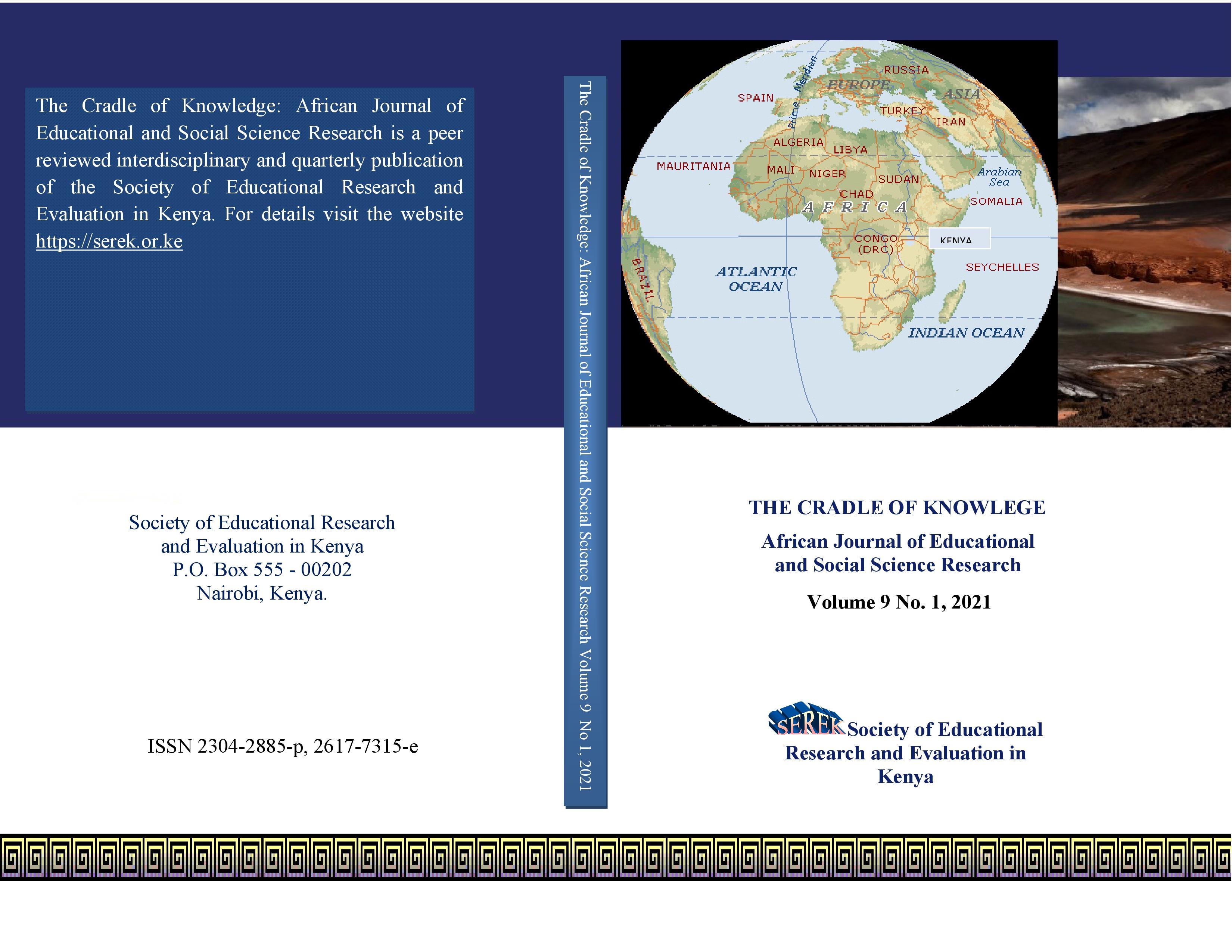
ENHANCEMENT OF COMMUNITY PARTICIPATION IN SUSTAINING COMMUNITY PRIMARY SCHOOLS IN KINKIIZI WEST CONSTITUENCY, UGANDA
Abstract
Community participation in education is a significant strategy for efficient and effective utilisation of limited resources to identify and solve problems in the education sector and offer quality education for children. The conception that communities and local governments cannot manage and sustain community schools is contestable. Community schools have been set up by different communities mainly in several parts of the developing world, in most cases in areas, which have been educationally abandoned by the government. However, these community schools are not well maintained due to a number of factors including low community participation. As such, the study explored practical strategies to enhance community participation in sustaining community primary community schools. A qualitative study, framed within an interpretivist paradigm, drawn on a multiple case study design was used. Guided by the theory of Action by Talcott Parsons, data was generated using focus group discussions and interviews and analysed using thematic analysis. 28 participants who are community members (parents and non-parents), community leaders, head teachers, and the District Education Officer were selected using purposive sampling. Two community primary schools, namely; Karangara and Buhoma community primary schools were purposively chosen as cases of study in Kinkiizi West constituency, Uganda. Findings revealed that effective implementation of school-community collaborations can accelerate the sustainability of community primary schools. This is through Inter-linkages and dependencies between community and School, establishment and ensuring effective communication channels and mobilization for community participation enlistment.
Key words: Community participation, Community primary schools, sustainability, practical strategies
Full Text:
PDFReferences
Alam, M. (2015). Effect of Community Factors on Primary School Learners’ Achievement in Rural Bangladesh.
Baldridge, B. J., Beck, N., Medina, J. C., & Reeves, M. A. (2017). Toward a new understanding of community- based education: The role of community-based educational spaces in disrupting inequality for minoritized youth. Review of Research in Education, 41(1), 381-402.
Baxter, P., & Jack, S. (2008). Qualitative case study methodology: Study design and implementation for novice researchers. The Qualitative Report, 13(4), 544–559.
Braun, V. & Clarke, V. (2006). Using thematic analysis in psychology. Qualitative Research in Psychology,3, 77- 101.
Bwana, A. H. A., & Orodho, J. A. (2014). The School–Community Partnership: What are the Nature, Type and Challenges of the Partnership on the Development of Education in Lamu East District, Kenya.
Creswell, J. W., Hanson, W. E., Clark Plano, V. L., & Morales, A. (2007). Qualitative research designs: Selection and implementation. The counseling psychologist, 35(2), 236-264.
Daniel, J. (2017). Strong Collaborative Relationships for Strong Community Schools. National Education Policy Center.
Đurišić, M., & Bunijevac, M. (2017). Parental involvement as a important factor for successful education. Center for Educational Policy Studies Journal, 7(3), 137-153.
Frankl, E. (2016). Community schools: transforming struggling schools into thriving schools. Brooklyn, NY: Center for Popular Democracy. Retrieved from Https://Populardemocracy.Org/News/Publications/Community-Schools-Transforming- Struggling schools-Thriving-Schools
Green, T. (2017). “We felt they took the heart out of the community”: Examining a community-based response to urban school closure. education policy analysis archives, 25, 21.
Gross, J. (2015). Strong School-Community Partnerships in Inclusive Schools Are" Part of the Fabric of the School. We Count on Them". School Community Journal, 25(2), 9-34.
Ice, M., Thapa, A., & Cohen, J. (2015). Recognizing Community Voice and a Youth-Led School- Community Partnership in the School Climate Improvement Process. School Community Journal, 25(1), 9-28.
Jabeen, S., Ul Haq, M. N., & Hussain, I. (2018). Community Participation in Socio- Economic Development through Secondary Education in one of the Remotest Regions of Pakistan. European Online Journal of Natural and Social Sciences, 7(4), pp. 663-680.
Lubell, E. (2011). Building Community Schools: A Guide for Action. Children’s Aid Society.
Ngalawa, A. A., Simmt, E., & Glanfield, F. (2015). Exploring the emergence of community support for school and encouragement of innovation for improving rural school performance: Lessons learned at Kitamburo in Tanzania. Global Education Review, 2(4).
Narwana, K. (2015). A global approach to school education and local reality: A case study of community participation in Haryana, India. Policy Futures in Education, 13(2), 219-233.
Nasir, M., Farooq, R., & Tabassum, R. (2017). Effectiveness of Community Participation in Public Sector Schools of Khyber Pakhtunkhwa. Dialogue, 12(4), 434.
Ngalawa, A. A., Simmt, E., & Glanfield, F. (2015). Exploring the emergence of community support for school and encouragement of innovation for improving rural school performance: Lessons learned at Kitamburo in Tanzania. Global Education Review, 2(4).
Ocan, B. (2017). Impact of Community Level Engagement in Primary Education: A Case Study of Oyam District, Northern Uganda, Uganda, East Africa.
Republic of Uganda. 2013. Uganda Vision 2040: A Transformed Ugandan Society from a Peasant to a Modern Prosperous Country within 30 Years. National Development Plan under Ministry of Finance, Planning and Economic.
Ross, G. L. (2018). Kansas City, Missouri, Inner City Schools' Parent Involvement Policy, Practices, and Accreditation Problems.
Russell, K. A. (2009). Community Participation in Schools in Developing Countries: Characteristics, Methods and Outcomes. Online Submission.
Samuel, T., Onchiri, K. O., & Kikechi, R. W. (2018). Influence of Cost Sharing Policy on Provision of Physical Facilities in Public Day Secondary Schools: A Comparative Study of Trans-Nzoia and West Pokot Counties, Kenya.
Thanh, N. C., & Thanh, T. (2015). The interconnection between interpretivist paradigm and qualitative methods in Education. American Journal of Educational Science, 1(2), 24–27.
Wedam, E., Quansah, J. Y. D., & Debrah, I. A. (2015). Community Participation in Educational Infrastructure Development and Management in Ghana. Education, 5(5), 129–141.
Waluyo, E., Handayani, S. S. D., & Diana, D. (2018). Family and Community Participation in the Development of Early Childhood Education after the Policy Program of one Village one ECE. Indonesian Journal of Early Childhood Education Studies, 7(2), 136-140.
Refbacks
- There are currently no refbacks.

This work is licensed under a Creative Commons Attribution 4.0 International License.
SEREK publication https://serek.or.ke
This work is licensed under a Creative Commons Attribution 4.0 International License